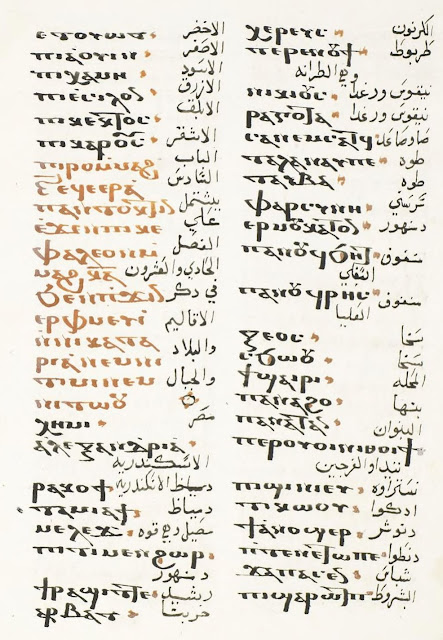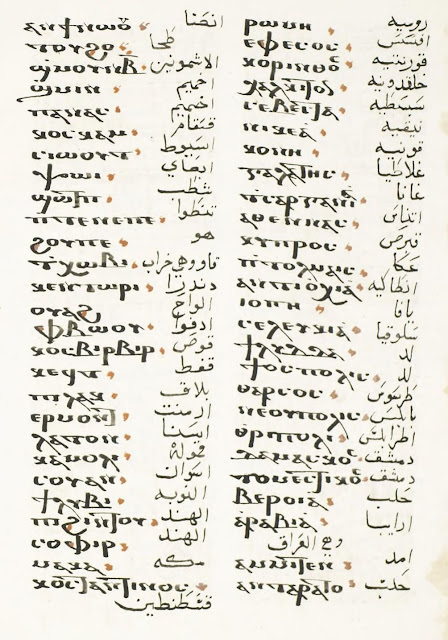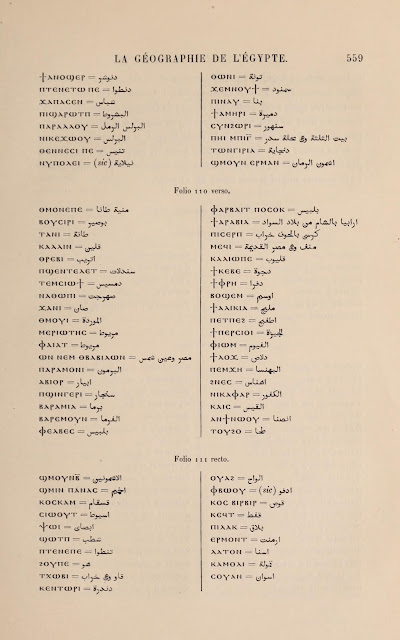 |
| فروع النيل القديمة |
النص التالي منسوخ من الترجمة الانجليزية لرحلة برنارد الحكيم للأراضي المقدسة وفيها يصف مروره بدمياط وتنيس والفرما والبقارة
THE ITINERARY OF BERNARD THE WISE.
(A.D. 870.)
HOW THE CITY OF JERUSALEM IS SITUATED.
(CiRC. A.D. 1090.)
bishops, monks and Christians throughout the whole of Egypt. These Christians have this law with the heathen, that each one pays for himself every year tribute to the aforesaid prince, that so they may live securely and freely. This tribute amounts to one or two or three golden pieces, or, in the case of a person of lower station, thirteen denarii. If however such an one cannot pay these thirteen denarii, whether he be a native or a Christian stranger, he is sent to prison, until either by the love of God he is delivered by his angel, or else is bought out by other good Christians.
VIII. These things being so, we returned back by the river Gihon three days' journey, and arrived at the city Sitinuth. From Sitinuth we proceeded to Maalla, from Maalla we crossed over to Damiate, which has the sea on the north and on all sides the river Nile, except for a narrow strip of land. Thence we voyaged to the city Tanis, where are Christians exceeding religious, burning with hospitality. This city has no land at all, except where the churches are; there is showed the plain of Thaneos, where lie, like three walls, the bodies of those who were destroyed in the time of Moses.
IX. From Tanis we came to the city Ferama, where is a church in honour of blessed Mary, in the place whither by the counsel of the angel Joseph fled with the Child and His mother. In this city there are a number of camels, which strangers hire from the natives of the region for carrying their baggage, on account of the desert journey of six days. The entrance to this desert begins at the aforesaid city ; and well is it called a desert, for it produces neither herb nor anything grown from seed, except palm trees, but is white like the country in time of snow. Mid-way there are two hospices, one called Albara, the other Albachara, in which the business is done of purchasing from Christians and pagans whatever is necessary for travellers. But all round the land produces absolutely nothing except what has been mentioned. From Albachara on there is a fruitful country as far as the city Gaza, which was Samson's city, a city exceeding rich in every- thing.
Thence we came to Alariza. From Alariza we arrived at Ramula, near which is the monastery of the blessed martyr George, where he sleeps. From Ramula we pushed on to the village of Emmaus. From Emmaus we arrived at the holy city, Jerusalem, and were received into the hostel of the most glorious emperor Charles, where all are admitted who come to this place for devotional reasons and speak the Roman tongue.
ثامنا. ولما كانت هذه الأمور على هذا النحو ، عدنا برحلة في نهر جيحون لمدة ثلاثة أيام، ووصلنا إلى مدينة سيتينوث Sitinuth (شطانوف؟! أم منوف؟!). ومن ستينوث انتقلنا إلى Maalla (المحلة؟!)، من Maalla عبرنا إلى دمياط، التي يحدها البحر من الشمال والنيل من جميع الجوانب، عدا شريط ضيق من الأرض. ومن هناك سافرنا إلى مدينة Tanis تنيس، حيث المسيحيون شديدي التدين، شديدي كرم الضيافة. هذه المدينة ليس لها أرض على الإطلاق إلا حيث توجد الكنائس. وهناك يظهر سهل ثانيوس Thaneos، حيث ترقد، مثل حوائط ثلاثة، جثامين من هلكوا في زمن موسى.
تاسعا. من تنيس ذهبنا للفرما، حيث بها كنيسة مكرسة لمريم العذراء، في المكان الذي بناءا على مشورة الملاك هرب اليه يوسف مع الطفل وأمه. وفي هذه المدينة جمال يستأجرها الغرباء من الأهالي لحمل أمتعتهم، في رحلة عبر الصحراء تستغرق ستة أيام. وتبدأ الصحراء من هذه المدينة. وبالفعل هي صحراء، فليس فيها عشب ولا زرع إلا النخل، وبيضاء مثل البلد وقت الثلج. وفي منتصف الطريق منزلان، أحدهما يسمى البرة Albara (؟!)، والآخر Albachara البقارة، وفيها تتم عمليات شراء من من المسيحيين والوثنيين لضروريات المسافرين. لكن في جميع أنحاؤها لا تنتج الأرض أي شيء على الإطلاق باستثناء ما تم ذكره. من البقارة الى بلد مثمر بعيد كمدينة غزة التي كانت مدينة شمشون، وهي مدينة غنية في كل شيء.
المصدر: The library of the Palestine Pilgrims' Text Society
by Palestine Pilgrims' Text Society (London, England); White, Andrew Dickson, 1832-1918. fmo (رابط)







